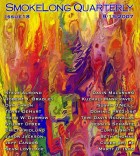Stigmata is primarily associated with the Roman Catholic faith, and yet there are several indications that your character, Alex, is Muslim—the headscarf, the eating of beef that is not prepared halal. What can you tell us about the role of stigmata in Islam?
So far as I know, there’s no role in Islam. Islam considers Christ a prophet, not a god, pretty much like Moses or Abraham or Mohamed himself, a leader who tries to show his fellow man how to live a righteous life. There’s no God but God, according to the Koran, and that means there’s just one Big Kahuna—no room in the pantheon for Jesus or the Holy Ghost. So I rather doubt a Muslim would place the same importance on stigmata as a Catholic. And that’s the meat of this story: isn’t it just like life to pitch this kind of curve ball?
What is the significance of the blood smelling like roses?
When I was in second grade, I had this marvelous teacher, Sister Stanislaus (this was at St. Hyacinth’s school; you can imagine the trauma for a little second-grader who had to label every homework paper with the name of her school and teacher) who told us terrific stories about miracles that couldn’t be found in the Bible. One of these tales was about how a Communist soldier sacked a Catholic church and stole a sacred host, which he nailed to a tree and used for target practice. He immediately converted to Catholicism when he saw the little round piece of bread bleed from its wound. I remember Sister’s eyes grew huge and she said, in a voice full of wonder, “And the *blood* smelled like roses.”
I filed that away, I guess.
How did you become interested in the topic of stigmata?
Oh, it was all Sr. Stanislaus. She was VERY big on stigmata. She used to tell us that it was one sign that someone was a real saint. Start bleeding spontaneously from the hands, feet and side, and it’s straight to Heaven, Do not pass go; do not collect $200. When you’re in second grade, and the classroom itself is in a de-consecrated old church, and your teacher is a nun in full habit who leans on a communion rail when she drills you on your spelling words, it’s hard to not be impressed by weird spiritual lore. The most interesting stories I read that year came from a little book called “The Lives of the Saints.” These weren’t your namby-pamby saintly types; they were folks like Francis, who talked with animals, and Maria Goretti, who got murdered defending her virginity—not that I knew what that meant, exactly—and Sebastian, who got stabbed in the heart so many times he bled like a fountain. This stuff was more grisly and fascinating than the Brothers Grimm.
Tell us about your collection of stories, Don’t Mean Nothing.
Funny…since we’re on the topic of my ardent Catholic youth: my best story in that book has a kick-ass Holy Confession scene in it. There’s another one where the main character is despoiled on the chapel altar (unlike Maria Goretti, she defended a different set of morals). I guess you can take the girl out of the church, but you can’t take the church out of the girl…
It’s a collection of short fiction based very loosely on my 13 months in Viet Nam, where I worked as an Army operating room nurse. Ballantine brought it out in late October of 2001—not the best timing for a decidedly unpatriotic work about the war we lost—and UMass Press did the paperback edition in 2004, which is still in print. It got great reviews, except for a nasty little hatchet job by some anonymous critic at Kirkus, who finished by calling it “M*A*S*H, with lots more sex and cursing.”
People tend to be put off by the very idea of Viet Nam war stories. Yes, there are some heavy scenes in my book—but it’s far from grim. There’s a lot of humor; humor is, after all, a vital coping mechanism in war. So I always include that Kirkus tag line in my publicity material to counter a potential reader’s oh-god-this-book-will-be-such-a-painful-ordeal prejudice.
Since this is my first issue with SLQ, I thought it’d be appropriate to discuss firsts. Writing firsts. First time you called yourself a writer, first publication, first check. Those sorts of things. So, dish. What is your most memorable writing first?
That would be in my freshman year in high school—a public school, because I finally convinced my mother that the Catholic school system was driving me nuts. My English teacher, a little pear-shaped man with a flat-top ‘do who wore a large gold cross on a chain around his neck and belted his plaid pants just beneath his armpits, told us to pen a one-page autobiography as our first writing assignment.
I was an indifferent student in most subjects, but I always got excellent grades in creative writing, and right away, I knew I could use this hum-drum assignment to stake my claim at the top of the class. So I threw myself into the task, made it clever and funny. I turned it in the next morning, beaming at the lesser mortals around me, and sat back to wait for the A+.
The next day, the teacher handed it back with a big red F at the top. “I won’t stand for plagiarism,” he told me, loudly enough for the whole class to hear. “I’ve read this somewhere before. I KNOW I have.”
I was stunned. He thought I’d plagiarized…my AUTOBIOGRAPHY??? And I was angry, humiliated and ashamed—the last, not because I’d done what he said I did, but because I was a teenager; teenagers are always ashamed on some level about something, warranted or not.
By the second or third assignment, the stuff I wrote pretty much convinced him that I really DID write like that without plagiarizing. Ultimately, I got my A+. But the bastard never apologized, and I never really forgave him.
I suppose that’s why I was less than sympathetic when my sister sent me the article last year from my old hometown newspaper that said he’d been arrested for an inappropriate Laying On of Hands in the youth group he led at his church.



 The core workshop of SmokeLong Fitness is all in writing, so you can take part from anywhere at anytime. We are excited about creating a supportive, consistent and structured environment for flash writers to work on their craft in a community. We are thrilled and proud to say that our workshop participants have won, placed, or been listed in every major flash competition. Community works.
The core workshop of SmokeLong Fitness is all in writing, so you can take part from anywhere at anytime. We are excited about creating a supportive, consistent and structured environment for flash writers to work on their craft in a community. We are thrilled and proud to say that our workshop participants have won, placed, or been listed in every major flash competition. Community works.